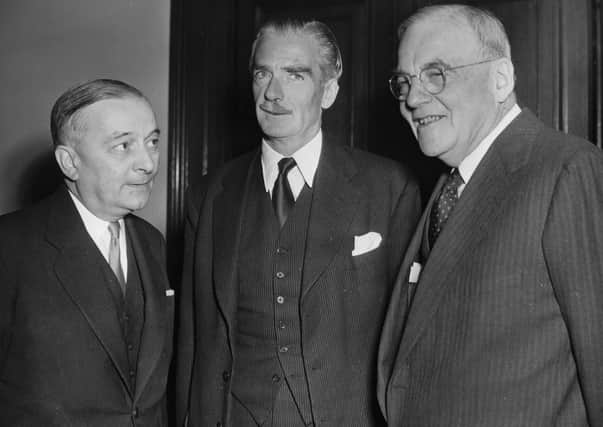THROUGH THE ARCHIVES: John Foster Dulles and US Atomic Secrets


“In matters connected with atomic energy the opinion of the United States Congress appears to be unstable and emotional, and the appeal which Mr [John Foster] Dulles [US Secretary of State] has just made for an amendment of the Atomic Secrets Act of 1946 will put it to the test,” declared an editorial published by the News Letter on this day in 1954.
It continued: “There were two intentions behind the Act 1946 first, to preserve to the United States for as long as possible the advantages of its superior atomic knowledge; and, secondly, to avoid the development of an atomic arms race.
Advertisement
Hide AdAdvertisement
Hide Ad“The second purpose has failed, for Russia has developed its own atomic bomb, and possibly has the hydrogen bomb as well; and in these circumstances the State Department feels that it ought to be in a position to transmit atomic information to those of its allies who are at present deficient in knowledge, and who, with knowledge, would be able to add immensely to the defensive power of the West.”
But the News Letter did not believe that the US Congress would not accept this argument.
“However rational this may be, Congress will not gladly accept it,” added the News Letter. “The time is coming, however, when America may be glad to receive information as well as to give it. The affair of Dr [J Robert] Oppenheimer has shaken confidence, and it is doubtful if the country could on indefinitely operating a sort of scientific ‘closed shop’.
“The spirit of research and inquiry does not flourish in that sort of atmosphere, and American scientists are clearly disturbed by the affair. Equally strange is the reported prohibition of Professor Dirac, of Cambridge University, from entering the United States in order to visit Princeton University. These decisions seem to be at variance with the official line as expounded by Mr Dulles to the Congressional Atomic Energy Committee.” “In matters connected with atomic energy the opinion of the United States Congress appears to be unstable and emotional, and the appeal which Mr [John Foster] Dulles [US Secretary of State] has just made for an amendment of the Atomic Secrets Act of 1946 will put it to the test,” declared an editorial published by the News Letter on this day in 1954.
Advertisement
Hide AdAdvertisement
Hide AdIt continued: “There were two intentions behind the Act 1946 first, to preserve to the United States for as long as possible the advantages of its superior atomic knowledge; and, secondly, to avoid the development of an atomic arms race.
“The second purpose has failed, for Russia has developed its own atomic bomb, and possibly has the hydrogen bomb as well; and in these circumstances the State Department feels that it ought to be in a position to transmit atomic information to those of its allies who are at present deficient in knowledge, and who, with knowledge, would be able to add immensely to the defensive power of the West.”
But the News Letter did not believe that the US Congress would not accept this argument.
“However rational this may be, Congress will not gladly accept it,” added the News Letter. “The time is coming, however, when America may be glad to receive information as well as to give it. The affair of Dr [J Robert] Oppenheimer has shaken confidence, and it is doubtful if the country could on indefinitely operating a sort of scientific ‘closed shop’.
Advertisement
Hide AdAdvertisement
Hide Ad“The spirit of research and inquiry does not flourish in that sort of atmosphere, and American scientists are clearly disturbed by the affair. Equally strange is the reported prohibition of Professor Dirac, of Cambridge University, from entering the United States in order to visit Princeton University. These decisions seem to be at variance with the official line as expounded by Mr Dulles to the Congressional Atomic Energy Committee.”
Comment Guidelines
National World encourages reader discussion on our stories. User feedback, insights and back-and-forth exchanges add a rich layer of context to reporting. Please review our Community Guidelines before commenting.